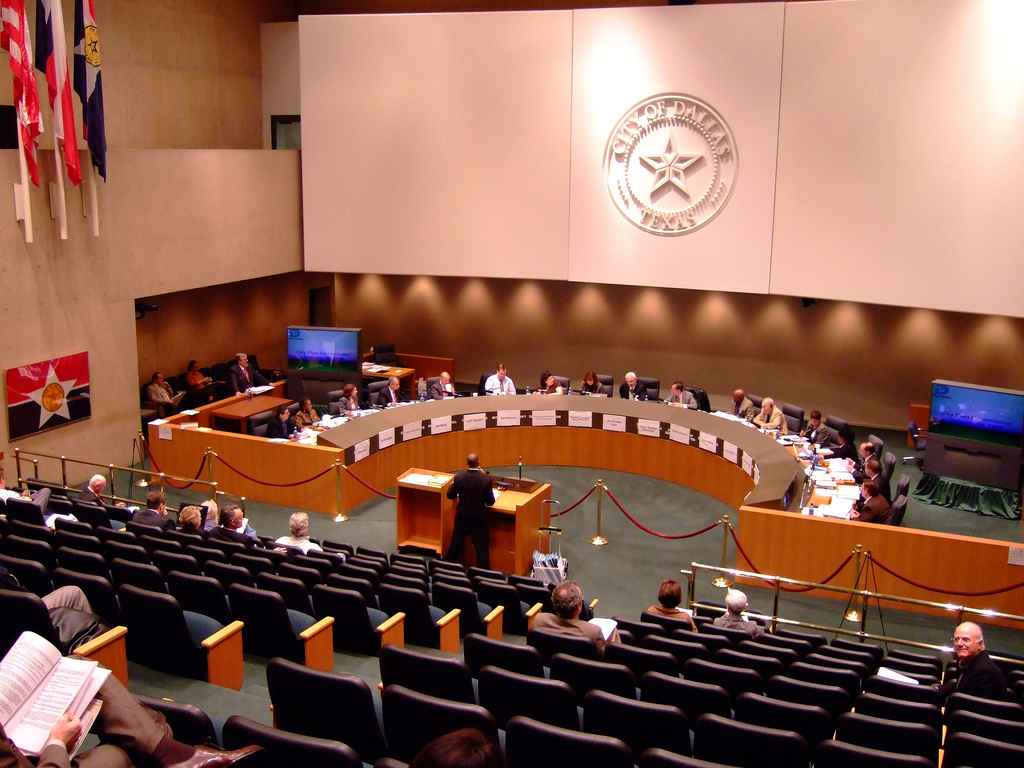
Dallas Police Chief Daniel Comeaux made waves when he reportedly turned down $25 million for our City’s police department to join a program from ICE that brings immigration enforcement to the local level.
Following that revelation, Mayor Eric Johnson issued a memo last Friday to the chairpersons on the Public Safety and Government Efficiency Committees respectively, asking them “to explore the potential benefits of participating in the 287(g) program.” And our East Dallas City Council members responded with statements.
The 287(g) program “(authorizes) U.S. Immigration and Customs Enforcement (ICE) to delegate to state and local law enforcement officers the authority to perform specified immigration officer functions under the agency’s direction and oversight,” according to ICE’s website.
Johnson specifically referenced the “Task Force Model” that would enable agencies “to enforce limited immigration authority with ICE oversight during their routine police duties,” according to ICE. WFAA reported that this includes: “the right to ask any person believed to be in the country illegally about their right to be in the United States, the power to arrest any person suspected of being in the county illegally who may flee before a warrant can be obtained; the power to make arrests for immigration law violations.”
ICE raids have been taking place across the country since President Donald Trump took office in January, and many of the arrests are for people with criminal records that are little to none. Attorneys in an article from The Marshall Project speculated that directives to capture and deport immigrants are leading to a rise in racial profiling.
Raids have also been aggressive and have created fear in immigrant communities, according to HIAS, an organization serving refugees. Those who are arrested can be deported without a judicial hearing since Trump expanded expedited removal, according to an article from the National Immigration Forum.
Johnson said in his memo that City Council needs to have a public meeting where residents can offer input to find out what information led to Comeaux’s decision to reject ICE’s offer. As for the program, the mayor cited potential financial benefits as well as those to public safety that the City could have with this partnership — reimbursement on eligible and trained 287(g) officers’ salary and benefits that could help the City hire more officers and resources to lower violent crime.
“Decisions on matters like this — especially one involving $25 million of public funds — should be made by elected policymakers after receiving public input,” Johnson said in his memo. “Accordingly, please convene a joint meeting of your committees as soon as possible to be briefed by ICE representatives and Chief Comeaux on the 287(g) program and specifically on ICE’s offer of $25 million to Dallas. With this information, you should then determine what, if any, financial efficiencies and public safety benefits Dallas might achieve by participating in ICE’s Task Force Model through the Dallas Police Department. You can then bring the matter to the full City Council with a thoroughly vetted recommendation.”
The Public Safety and Government Efficiency Committees both contain East Dallas representatives. Mayor Pro Tem and District 2 Council member Jesse Moreno serves as the vice chairperson on the Public Safety Committee, while District 9 and 14 Council members Paula Blackmon and Paul Ridley, respectively, are on the Government Efficiency Committee. All of them have released separate statements with other council members.
Jesse Moreno
Moreno and District 6 Council member Laura Cadena recently put out a statement that “(encouraged) residents to reach out to their elected officials and share your concerns, experiences and perspectives to ensure that community input remains at the center of decisions that affect our city.”
“The Dallas Police Department’s mission is to serve the people of Dallas by striving to ensure public safety and proactively strengthening community relationships,” Moreno and Cadena’s statement reads. “Immigration enforcement is the responsibility of the federal government. Local law enforcement agencies, including ours, are committed to maintaining trust with the communities we serve — trust that is essential to effective policing and public safety for all residents.”
Paula Blackmon
With council members in Districts 1, 5 and 7, Blackmon signed onto a statement that, like Moreno’s, points out that immigration control is a federal responsibility. Blackmon’s joint statement explicitly spoke up for immigrants and expressed concern for the public’s trust in the police department if the City were to be in the 287(g) program.
“We remain concerned with the practices being deployed by ICE agents through federal directives,” the statement reads. “The 287(g) program would turn local law enforcement into an arm of federal immigration enforcement and could result in a betrayal of trust between the Dallas Police Department and the very communities they are sworn to protect. Said another way, safer communities are built through trust and connection. DPD participating in this program would certainly undermine progress made. We know the impact of these federal actions will have implications long past the current administration, and we must decide who we are as a community. We believe we can uphold both the City’s commitment to humanity and public safety. Immigrants have made enormous contributions to our city — from education, workforce and economic development to the arts, and even our beloved sports teams. There is no corner of Dallas that has not been touched positively by our international community.”
The letter closes by signaling support for a public conversation on this topic.
Paul Ridley
Ridley joined a statement with council members of Districts 10 and 13, and it’s also supportive of talking about this matter in public meeting while again pointing out that immigration control is up to the federal government.
“We fully support our sworn officers in keeping all Dallas residents safe and share Chief Comeaux’s commitment to strengthening community trust,” the statement reads. “Safe cities are built on the foundation of trust and mutual respect between its officers and the communities they serve.”
